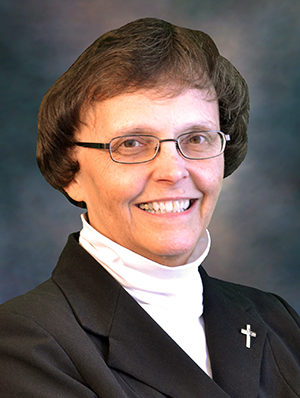
Naturally
Sister Joyce Lehman • President, Sisters of the Precious Blood
These days of late spring and early summer are wonderful times of the year. There is a lushness in the green: things are still fresh, crisp, clean and varied. Plants and trees cycle through their bloom times offering white and pink and lavender, red and yellow and orange and purple. Light green growth pushes out of the tips of bushes and trees until with time it mellows to look like the rest. Eventually, either our eyes begin to gloss over the differences and the greens do begin to look alike, or the dust generated by nature and human industry buffers the difference into sameness.
If we get, or take, the chance to really look around ourselves as spring morphs into summer, we also see crops in the fields struggling through the first growth spurts, jockeying with each other for the necessary water and nutrients to develop, mature and become food on our tables. If we’re lucky we might also see young calves dancing beside their mothers, or impossibly white, knock-kneed lambs gazing quizzically at our cars as we drive past.
All this new life reminds us that death cannot win in the end. What had appeared lifeless and unproductive just a few months ago is now burgeoning with life. God has a plan for the natural world. Human beings are part of that plan and we thrive most when we cooperate with nature’s rhythms.
In the first creation story in the book of Genesis, God tells Adam and Eve that they should “fill the earth and subdue it … have dominion over the fish … the birds … and all living things.” In the second creation story in chapter two, God settles Adam in the garden to “cultivate it and care for it.” In that same story, before providing a mate for Adam, God brings the animals to him who then gives each of them a name, thus establishing a relationship with them.
The dynamics in the two stories offer two views of our relationship with non-human creation. We can see ourselves either as dominators or as caretakers. A temptation if we understand dominion to mean domination or “control over” leads us to do so for personal satisfaction or gain. We disrupt nature’s cycles, create organisms that we believe enhance human life by providing greater profit, and assume we will ultimately win over nature and control it. Dominion might also mean “to govern for the common good,” in which case we would care for the planet so that not only we, but also it would thrive.
When we see ourselves as caretakers or stewards, we enter into a relationship with nature, cherishing what we have been entrusted with and respecting its cycles and rhythms by living within their limitations as well as their strengths. We are careful so that what we are doing does not violate the air, the land or the waters that sustain our life and the life of all living things.
If we pay attention and reflect on the history of our planet, we begin to see that nature has a way of correcting what has been done to it by adapting and evolving. God has placed deep within nature an indomitable urge for fostering life. If humanity does not destroy itself first, God’s natural world may end up “spitting us out,” as one scientist puts it, by generating an atmosphere in which human beings are incapable of living but to which nature can acclimatize and adapt.
As we look around ourselves and enjoy God’s gifts to us given through the natural world, maybe we can take a moment to ask ourselves how we see ourselves in that world … as one who dominates and subdues or as one who stewards and is in relationship with. Whichever way we relate to this gift of God, may we never cease to thank God in appreciation and gratitude.





